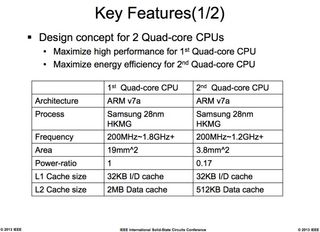Samsung's Exynos 5 Octa Functions as a Quad-Core Processor, Says Developer
According to developer AndreiLux, a poor implementation of the big.LITTLE driver means that a maximum of four of the Samsung Exynos 5 Octa’s cores are actually operational.

Though the Samsung Exynos 5 featured in the Galaxy S4 is technically an octa-core processor, Android kernel developer AndreiLux has reported that only four of its cores work at any given point in time. The developer attributes this to a remarkably poor implementation of the big.LITTLE driver, whereby the Linux kernel doesn’t differentiate between the various architecture based cores, and the following takes place:
- Cluster migration: When load rises, just like when a phone increases its frequency per DVFS, all the cores will jump from the LITTLE processor to the big one. You either have four A7 cores or four A15 cores online.
- Core migration: When load rises, it will only jump those cores from the LITTLE processor whose load exceeds the capacity of the A7 cores; you can have a single A15 online with three A7′s on, or any other combination of a total of four processors.
- HMP (Heterogeneous Multi-Processing): This is a vastly more complex working mechanism, and its implementation is also an order of more sophisticated magnitude. It requires the kernel scheduler to actually be aware of the differentiation between the A7 and A15 cores. Currently, the Linux kernel is not capable of doing this and treats all CPUs as equals. This is a problem since we do not want to use the A15 cores when a task can simply be processed on an A7 core with a much lower power cost.
Thankfully, this problem can be resolved by simply updating the kernel so the Exynos 5’s eight physical cores operate in tandem and allocate more demanding tasks to the chip’s more powerful cores. Doing so should result in significant performance gains and improvements to battery life which were not, coincidentally, Samsung’s stated reasons for using an octa-core processor in the first place.
Stay On the Cutting Edge: Get the Tom's Hardware Newsletter
Get Tom's Hardware's best news and in-depth reviews, straight to your inbox.
-
DRosencraft Driver development and implementation continues to be the bane of technology development. I feel for the people who have to read through and write all that code. When it doesn't work we get pissed and tend to forget the work that went into it. Usually it is something relatively small that makes a huge difference. Just glad they can fix this one without too much headache.Reply -
siddallj Will we be able to get the 8 core S4 in the UK, im not bothered if it doesn't have 4G, i live in Wales, we're not gonna get it till S5/S6 timeReply -
tipoo This is what bugged me about every blog calling it an octo core, sure it technically has eight cores in there but only four are ever active at once.Reply -
ojas Har har. Who's surprised, except the Tom's news team and Zak Islam.Reply
+1 to what tipoo said. -
vmem I think most of us figured this was the case just by reading the release specs on that processor. besides, it would be a bit strange for cellphone apps to be suddenly capable of using 8 cores when half of the phones are still dual-core. just remember how long it took us to make that jump on PCs. of course, it'll be faster, but we still need the majority of users to upgrade first before developers will bother doing itReply -
guru_urug Am I missing something here or is there a glaring mistake in the table? Shouldn't the 1st quad-core be mentioned as being based on the cortex A15 architecture?Reply -
guru_urug Oops I just realised, they meant the instruction set which is indeed ARM v7a. In my haste I read it A7. My bad, guess I need some sleep.Reply -
rwinches The big/little is about power/efficiency. There is no driver issue. I think this is great. ARM is moving at a lighting pace. Yeah OK so at some point there will be powerful multi-core low drain Soc's. Many commenters keep wanting more complexity and faster cores yet claim they hate bloat, long boot times and short battery life.Reply -
redeemer With Tegra 4i and SnapDragon 800 around the corner how cares about Exynos 5, seriously.Reply
Most Popular


